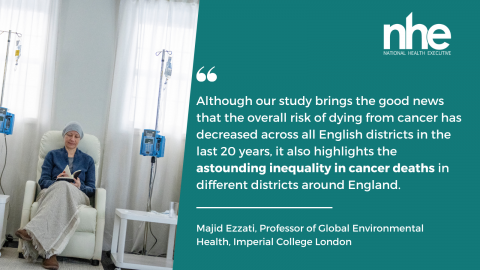Experts have called for change after new research revealed the “astounding” inequalities in cancer mortality risk across different regions in England.
Research led by Imperial College London and published in the Lancet Oncology shows that, while the national risk of dying from cancer before the age of 80 declined between 2002-2019, some districts enjoyed much greater decreases than others.
Researchers used Office for National Statistics data to analyse death records for men and women from the 10 cancers with the largest death toll – this ranged from lung and bowel cancer, to prostate cancer in men and breast cancer for women.
The study team found that, of the 314 regions in England, the greatest reduction for women was in Camden, London at a 30.1% decline in risk of dying from cancer before 80. This was almost five times the smallest decline in Tendring, Essex which was just 6.6%.
A similar trend was observed for men where the greatest reduction was triple that of the smallest – 36.7% in Tower Hamlets, London compared to 12.8% in Blackpool.
In 2019, the risk of dying from cancer before 80 could range from one in 10 for women living in Westminster to one in six in Manchester, while men ranged from one in eight in Harrow to one in five in Manchester.
Northern cities such as Manchester, Liverpool, Hull and Newcastle, as well as the coastal areas to the east of London had the highest risks of dying.

Lung cancer was one of the conditions with the biggest disparities, as data showed that, in 2019, women in Knowsley had triple the risk of dying than those in Waverley – men in Manchester also had triple the risk of dying from lung cancer compared to men in Guildford.
First author on the study and Imperial College London PhD student, Theo Rashid, explained: “The greatest inequality across districts was for the risk of dying from cancers where factors such as smoking, alcohol and obesity have a large influence on the risk of getting cancer.
“Due to funding cuts, many local authorities have reduced their budgets for smoking cessation since 2010. Our data shows we cannot afford to lose these public health programmes and are in urgent need of the reintroduction and strengthening of national and local policies which combat smoking and alcohol.”
Amanda Cross, a cancer epidemiology professor at Imperial College London, further outlined: “Access to cancer screening and diagnostic services which can prevent cancer or catch it early are key in reducing some of the inequalities our study highlights.
“Those who are more deprived are less likely to be able to access and engage with cancer screening. To change this, there needs to be investment into new ways to reach under-served groups, such as screening ‘pop-ups’ in local areas like supermarkets and working with community organisations and faith groups.”
Image credit: iStock



















